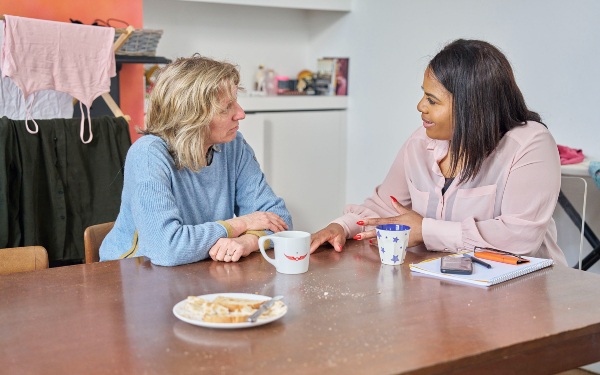
By Natasha Sabin, Centre of expertise on child sexual abuse
Across the UK in 2021, there were, on average, over 850 arrests for online sexual offences every month. Sadly, the ease with which child sexual abuse material can be viewed and shared has led to a huge growth in the production of abuse images and in the numbers of people accessing them.
Data shows that, compared with those convicted of other forms of sexual offending, individuals who access child sexual abuse material are more likely to be married and have children. So, hundreds of families will find out a parent or carer has viewed and shared child sexual abuse material each month and social workers need to feel able to support them through this discovery.
When the police (sometimes accompanied by a social worker) make their initial visit to the family home, this will, for many families, be the first contact that the child(ren) have had with a police officer or social worker.
Devastating impact on families
Unfortunately, children are often there at the time of arrest and may witness a distressing series of events, without any ability to make sense of what is happening. Similarly, discovering that a partner, who may be the parent of their child(ren), has viewed and shared child sexual abuse material is likely to be devastating.
More CSA guidance
For more guidance on child sexual abuse, check out Community Care Inform Children’s CSA knowledge and practice hub, authored by the CSA Centre. This covers topics including learning from the lived experience of survivors, communicating with and supporting children, sibling sexual abuse and supporting non-abusing parents. It is available to CC Inform Children subscribers.
I know from working with many social workers and social work managers that this is an area which, understandably, can feel challenging. Many social work managers have told me that their staff teams feel deskilled and don’t know where to go to find up-to-date, practical, and concise guidance, which feels disheartening.
Managing the risk and trauma of online sexual offending needs careful consideration of the impact on the whole family, a full understanding and appreciation of risk, and the ability to draw all this together to ensure safety in, and for, everyone in the home.
Step-by-step guidance for social workers
In collaboration with the Lucy Faithful Foundation, we have created a new, practical resource to help. Managing risk and trauma after online sexual offending: A whole-family safeguarding guide helps direct social workers through the steps they should take in practice.
It provides guidance on understanding the impact on the family as a whole, and individually; sets out what is known about the risks posed by people who access, possess or share child sexual abuse material, including key considerations for assessments; shares practical suggestions for supporting the whole family; and, finally, offers important information about how social workers can take care of their own wellbeing.
Related articles
For a child in this situation, their distress at this time may be rooted in a whole range of experiences, including witnessing the arrest of their parent, experiencing their non-offending parent’s own distress and confusion, having their home searched and electronic devices taken away, losing friendships and the natural grief and loss from the absence of their offending parent.
For the parent who has just discovered their partner is someone who may have offended, they are likely to be in shock, confused and frightened, and unsure what to tell their child(ren) to help them make sense of what has happened.
Elevated suicide risk
When we are considering the impact on the family, we cannot ignore the fact that the risk of suicide among men arrested for accessing child sexual abuse material is estimated to be 100 times higher than the suicide risk among the general population.
There appears to be a heightened risk of suicide at times when there is a threat of public exposure and when the legal process becomes a reality – for example, at arrest, charge, trial, and conviction.
The death of a parent by suicide is devastating for children; they will experience feelings of grief, but they may also feel that the person has chosen to die or ‘leave them’. Such an impact on the child is likely to be lifelong and will leave the family living with a whole new reality.
It’s important to recognise that those early responses you give to the family are extremely powerful. By being credible, accessible, and honest you will support the family to navigate their way through a time of great distress.
Balancing risk assessment with support
As social workers, you often have the delicate task of both assessing risk while providing support. When a parent sexual offends online you need to do just that: to have an understanding of the factors which may indicate a child has or may be sexually abused, while offering essential support to all the family.
I was delighted when I spoke to a manager who has very recently used this resource in supervision and who saw an immediate increase in the confidence of the social worker to support the whole family.
Very flatteringly, their social worker said that this was “the best step-by-step guide to responding to online sexual offending they have ever read”. I hope this new guide also gives you also the knowledge and confidence to support you through this process.
Do download the guide today and share it with your colleagues.
Natasha Sabin is practice improvement adviser at the Centre of expertise on child sexual abuse (CSA Centre) and author of the Managing risk and trauma after online sexual offending guide




 Family help: one local authority’s experience of the model
Family help: one local authority’s experience of the model  ‘I spent the first three months listening’: how supportive leadership can transform children’s services
‘I spent the first three months listening’: how supportive leadership can transform children’s services  How senior leaders in one authority maintain a culture of excellence
How senior leaders in one authority maintain a culture of excellence  How staff support ensures fantastic outcomes for children and families
How staff support ensures fantastic outcomes for children and families  Workforce Insights – showcasing a selection of the sector’s top recruiters
Workforce Insights – showcasing a selection of the sector’s top recruiters 

 Facebook
Facebook X
X LinkedIn
LinkedIn Instagram
Instagram
Comments are closed.